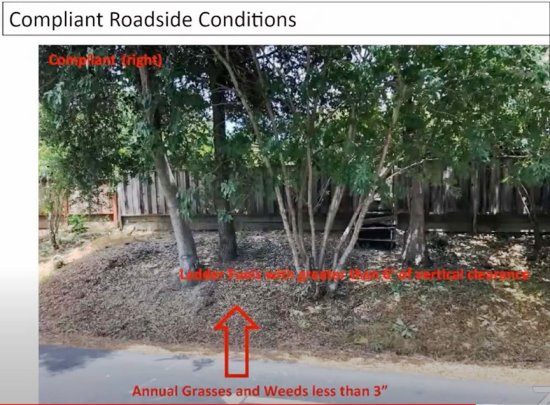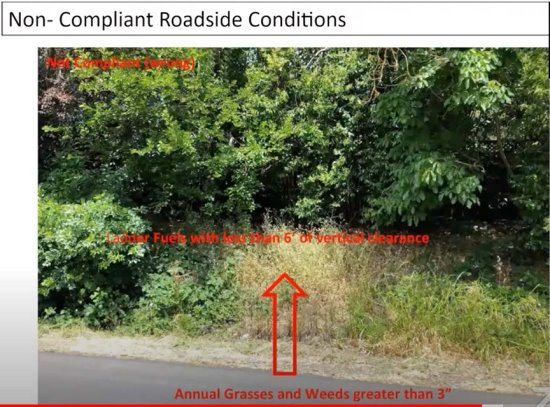Some say it takes a village to raise a child, but Moraga-Orinda Fire District Chief Dave Winnacker suggests it's equally true that it will take a village to protect each other from wildfire.
 Hardening homes from the threat of fire by trimming bushes and trees to provide a 1-foot air gap under bushes, and a 6-foot space below tree branches, and removing mulch so it's between 2 to 5 feet away from homes are just a few ways local residents can help one another prepare for what is looking to be an historic fire season, Winnacker said at the June 14 Lamorinda CERT meeting.
Hardening homes from the threat of fire by trimming bushes and trees to provide a 1-foot air gap under bushes, and a 6-foot space below tree branches, and removing mulch so it's between 2 to 5 feet away from homes are just a few ways local residents can help one another prepare for what is looking to be an historic fire season, Winnacker said at the June 14 Lamorinda CERT meeting.
 "This is the fourth lowest rainfall in history," Winnacker explained. "There is a lack of live fuels - green things that should be holding moisture never sprouted and we saw fires in April down south like mid-season fires they don't usually see until August." Winnacker said there's a 30% chance of another lightening event this year and the drought has weakened trees and spread disease. "Monterey pines and Eucalyptus are dying off in record rates; entire groves are dying off quickly." It is a homeowners' responsibility to remove dead trees if their homes are on parcels of less than one acre. "If a pine tree is red, it's dead. It needs to come out," he said.
"This is the fourth lowest rainfall in history," Winnacker explained. "There is a lack of live fuels - green things that should be holding moisture never sprouted and we saw fires in April down south like mid-season fires they don't usually see until August." Winnacker said there's a 30% chance of another lightening event this year and the drought has weakened trees and spread disease. "Monterey pines and Eucalyptus are dying off in record rates; entire groves are dying off quickly." It is a homeowners' responsibility to remove dead trees if their homes are on parcels of less than one acre. "If a pine tree is red, it's dead. It needs to come out," he said.
 The Lamorinda area is no stranger to wildfires. In the Mediterranean counties of California, pre-European settlement, fires burned every three to five years. In 1923, a wildfire burned out of Wildcat Canyon up and over into the city of Berkeley, into the downtown and didn't stop until the wind let up, Winnacker said.
The Lamorinda area is no stranger to wildfires. In the Mediterranean counties of California, pre-European settlement, fires burned every three to five years. In 1923, a wildfire burned out of Wildcat Canyon up and over into the city of Berkeley, into the downtown and didn't stop until the wind let up, Winnacker said.
 The 1970 Fish Fire, up by the intersection of Fish Ranch, Skyline and Grizzly Peak, burned down several homes. And in 1991 the Tunnel Fire burned with tremendous ferocity and exceptional spread rates downslope, and mimicked the 1923 fire. "All of these fires happened in the fall, in conjunction with the Diablo Wind event, where we saw very dry winds out of the north or northeast at the end of the summer season where fuels had not seen rain for as much as 270 days since the last wetting rain, and the conditions were set for explosive fire spread aided by the very dry air."
The 1970 Fish Fire, up by the intersection of Fish Ranch, Skyline and Grizzly Peak, burned down several homes. And in 1991 the Tunnel Fire burned with tremendous ferocity and exceptional spread rates downslope, and mimicked the 1923 fire. "All of these fires happened in the fall, in conjunction with the Diablo Wind event, where we saw very dry winds out of the north or northeast at the end of the summer season where fuels had not seen rain for as much as 270 days since the last wetting rain, and the conditions were set for explosive fire spread aided by the very dry air."
 Nothing has changed since 1923 or 1991, he said. "In fact, there is more fuel now than there was then. And while we have more fire fighting resources, a fire of the size and intensity of those fires cannot be stopped during its initial runs. . We have a very real threat here."
Nothing has changed since 1923 or 1991, he said. "In fact, there is more fuel now than there was then. And while we have more fire fighting resources, a fire of the size and intensity of those fires cannot be stopped during its initial runs. . We have a very real threat here."
 All Lamorinda residents should sign up for Community Warning System alerts and know their evacuation zones, said Winnacker. "Get neighbors to sign up for CWS, and if you get evacuation orders, leave immediately, honk your horn, knock on doors, and get neighbors in cars." Preparing for evacuations in advance is vital, since any delays can mean you are likely to run into downstream traffic on the few arterials leading to safety. "We do not have surface street capacity for everyone to get on the roads at the same time."
All Lamorinda residents should sign up for Community Warning System alerts and know their evacuation zones, said Winnacker. "Get neighbors to sign up for CWS, and if you get evacuation orders, leave immediately, honk your horn, knock on doors, and get neighbors in cars." Preparing for evacuations in advance is vital, since any delays can mean you are likely to run into downstream traffic on the few arterials leading to safety. "We do not have surface street capacity for everyone to get on the roads at the same time."
 In the event of a large fire where an evacuation may not be possible, Winnacker said your home may become the default location for your safety, so hardening your home against fire becomes all the more essential.
In the event of a large fire where an evacuation may not be possible, Winnacker said your home may become the default location for your safety, so hardening your home against fire becomes all the more essential.
 While Winnacker said he would prefer all landscaping involve only gravel, planting ground cover or succulents close to structures or having nothing on the ground that can burn near your home is ideal. "Create a situation where fire needs to work to burn," he said. "Fuel is the only thing we can mitigate. It's critically important that residents do their part."
While Winnacker said he would prefer all landscaping involve only gravel, planting ground cover or succulents close to structures or having nothing on the ground that can burn near your home is ideal. "Create a situation where fire needs to work to burn," he said. "Fuel is the only thing we can mitigate. It's critically important that residents do their part."
 To view Winnacker's entire presentation, visit: https://www.youtube.com/watch?v=zaMKre4qbXU&ab_channel=Moraga-OrindaFireDistrict
To view Winnacker's entire presentation, visit: https://www.youtube.com/watch?v=zaMKre4qbXU&ab_channel=Moraga-OrindaFireDistrict
 To sign up for CWS, visit: https://cwsalerts.com/
To sign up for CWS, visit: https://cwsalerts.com/ |


